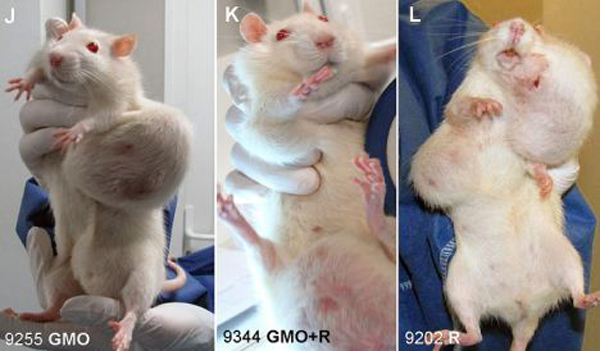 |
| c/o Natural News |
I’m no defender of big food business and what can only be called their occasional shady business practices but we need to be rational as well as skeptical. What’s the truth behind these freaky rats?
It turns out that the truth is more complicated than the news reports (and the researchers) would have us believe.
The first problem is the “science” involved in the study. There wasn’t much of it.
Firstly the researchers from the University of Caen in France neglected to mention that this particular strain of rat (“Sprague-Dawley”) get exactly this sort of tumor at the drop of a hat. They’re known to develop these enormous growths when allowed unlimited food or if they develop a hormone imbalance after consuming maize contaminated with a particular common fungus, or even if they are just allowed to live to old age. Whether or not they were given GM food, they would probably have developed the gruesome growths anyway. The researchers neglected to mention this in their report. Suspicious yet?
Then there was the rather selective report the “scientists” gave of their results. Their report only gave the results of SOME of the test groups of rats, other test groups exposed to GM food actually ended up healthier than the control group who had not received any GM food. They also neglected to publish any actual statistics from these groups so we could see the actual results. Suspicious yet?
Then there’s a technical detail. Generally in tests like this, the test group (that receive the thing being tested) is roughly the same size as the control group (the ones that don’t). It makes the mathematics simpler. In this case the test group was four times larger than the control group. Professor Anthony Trewavas from the University of Edinburgh, was quoted by New Scientist magazine, saying “these results are of no value”. Suspicious yet?
Sorry to be picky but consider one other thing. The researchers didn’t allow reporters to seek comments from other scientists about the “findings” until after the report was published. Did they have something to hide? Like bad science?
Perhaps if we ignore all of this, gloss over the fact that these rats get the tumors anyway and ignore the scientific skullduggery and statistical weirdness, it might still make sense?
No, still no joy. Every other similar experiment has showed no such effect of GM foods. It’s possible that this one is true and all the others are false but that’s not likely, particularly when you consider one last thing. Who undertook the research.
The lead researcher, Gilles-Eric Séralini, isn’t afraid of declaring his position. He heads the scientific board of the Committee for Research and Independent Information on Genetic Engineering, an organization opposed in principle to genetically modified food. Did I mention that Séralini has a book and film coming out simultaneously, entitled “All of Us Guinea-Pigs Now?” Hardly unbiased. Suspicious yet?
I’m not going to state that GM foods are perfect, that’s not my point. My criticism, along with people infinitely more qualified than I am, is that the science in this case is dodgy. This study is deeply flawed and it’s results can’t therefore be taken seriously. If the critics of GM food want to persuade the people and the scientific community that GM foods are dangerous they need to come up with some real science rather than results like these that can so easily be dismissed. They don’t realize that when they do this they become their own worst enemies.
No comments:
Post a Comment